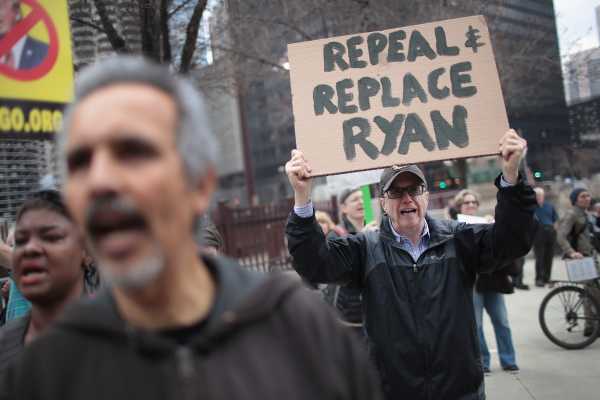
Republicans in Congress have given up on Obamacare repeal in 2018, but they could still resurrect it in 2019.
The White House and outside conservative groups are still working to tweak the last Obamacare repeal bill left — a plan that would block-grant funding to states to come up with their own health care plans — to make it more politically palatable and find a path to 50 votes in the Senate. It’s not at all out of the question that Republicans will hold on to the House and expand their Senate majority in the 2018 midterms. And if they do, repeal could quickly be back on the agenda.
“There would certainly be forces pushing for this, so I take it seriously,” Kim Monk, who tracks health care policy for Capital Alpha. Senate aides say privately that Republicans remain open to taking on repeal again next year.
It is easy to forget how close Republicans came to rolling back the 2010 health care law. The House did pass a bill, and the Senate came within one John McCain thumbs down of passing its own repeal bill. The failed sprint to pass another repeal plan by Sens. Bill Cassidy (R-LA) and Lindsey Graham (R-SC) last September showed that Republican leaders were willing to take another crack at repeal if they found some momentum.
“We have to not give up just because it was hard. And we didn’t quite make it over the finish line,” Katy Talento, one of the top White House aides on health policy, said at a panel last week, as Politico reported. “Sometimes you have to come back and come back and come back.”
Republicans are still working on an Obamacare repeal plan
Even though they couldn’t pass a full repeal law, Republicans have found other ways to undermine the Affordable Care Act.
Republicans in Congress did repeal the law’s individual mandate in their tax bill, slaying their most-hated provision in the law. The consequence of doing so is driving up next year’s insurance premiums, as health plans compensate for what they expect will be a sicker customer base. The Trump White House is also taking administrative steps to funnel people out of the Obamacare markets through their expansion of association and short-term health care plans and to cull the rolls from the law’s Medicaid expansion through work requirements and other new restrictions.
But the Medicaid expansion, the law’s protections for preexisting conditions, its insurance subsidies — all things that most Republicans in Congress voted to roll back last year — are still on the books. After nearly a decade of promising to repeal the law root and branch, it’s an embarrassing failure for the GOP.
The Washington Examiner reported recently that Vice President Mike Pence and outside conservative groups were still working to tweak the Graham-Cassidy plan, which would have ended Medicaid expansion and turned much of Obamacare’s Medicaid and subsidy funding into state block grants while allowing states to bring back preexisting conditions.
“I believe the part where they are working on something,” one GOP health care lobbyist told me. “I don’t believe there is any way it gets further than any of the previous attempts in this Congress.”
“This Congress” being the operative term.
No matter what happens with Congress, the health care implications are enormous
It’s actually quite easy to imagine a scenario where Republicans actually have a clearer path to Obamacare repeal in 2019 than they did in 2017. Democrats have turned out well in special elections in 2017 and 2018, but Republicans have a sizable advantage in the race for the House thanks to gerrymandered districts that protect GOP incumbents. Right now, the generic congressional ballot is right on the threshold of what most experts think would be needed for Democrats to win the House.
As for the Senate, the Republican advantage is even stronger. Democrats must defend 10 seats in states that Trump won in 2016 — including solidly red states like Missouri, West Virginia, Indiana and North Dakota — while having really only two good opportunities to win seats currently held by Republicans.
Control of Congress in 2019 could go any number of ways, with different implications for the health care law.
Republicans keep control of the House: There will be serious pressure on them to revisit Obamacare repeal in 2019. They can rationalize it this way: They passed a bill in 2017 (even if the Senate didn’t), yet voters still kept them in power. The House’s success in passing a repeal bill in May after coming up short in March underscores how the pressure to deliver on such a high-profile promise can whip members into line.
Republicans manage to expand their Senate majority: It isn’t hard at all to imagine a scenario where Majority Leader Mitch McConnell has 54 votes to work with instead of the 51 he has now. If the GOP manages to win races in West Virginia, Missouri, Indiana, and North Dakota (or even Florida), while only losing a seat in Nevada, they would have a 54-member majority. In that case, they could still lose Sens. Susan Collins (R-ME) and Lisa Murkowski (R-AK) — the Senate Republicans who have thus far opposed every version of repeal — and nevertheless find a path to 50 votes.
Democrats take back just the House: Obamacare would suddenly look safe at least through 2020, when Democrats would have a chance to win back the White House and advance their own health care agenda.
It’s possible that a Democratic House and a Republican Senate could reopen negotiations to stabilize the health care law, something of a white whale for Sens. Lamar Alexander (R-TN) and Patty Murray (D-WA), though the fraught politics that sunk a bipartisan deal this year would probably be equally true heading into a presidential election year.
A Democratic House could start passing their own health care bills — expanding insurance subsidies, instituting the now-popular public option, allowing people to buy into Medicare at a younger age, even single-payer health care — and let the Republican Senate and the Trump White House kill them to draw an even-sharper contrast with the GOP.
Democrats retake control of the House and the Senate: They could then potentially amplify the pressure even more, by forcing Trump to veto their health care bills, just as Republicans sent a repeal bill to President Obama in 2015.
On top of that, they could exercise more rigorous oversight of the Trump administration’s actions to undermine the Obamacare markets and Medicaid, setting up health care as a defining issue in 2020, a potentially winning message considering voters trust Democrats more on health care and the ACA is only growing in popularity.
No matter what, health care is on the ballot this fall
All of this is speculative, of course, but it underscores exactly how high the stakes are for health care in the 2018 midterms. Democrats clearly know the value of health care in the 2018 midterms, and they are making it much more central to their campaign messaging.
Their messages also have the virtue of being true. Because if Democrats do fail to retake at least one chamber of Congress in the midterm elections, Obamacare could rapidly be back on the chopping block.
Sourse: vox.com






